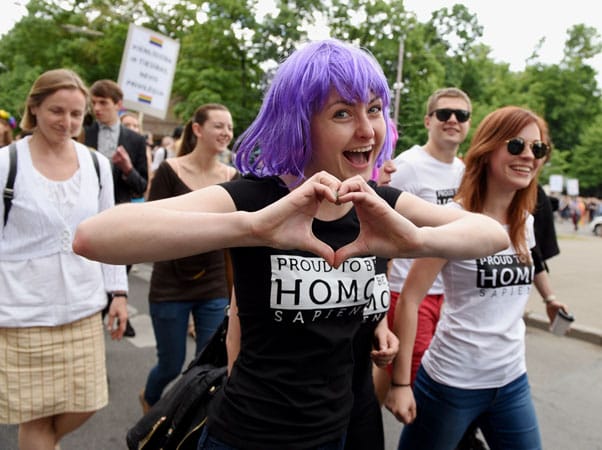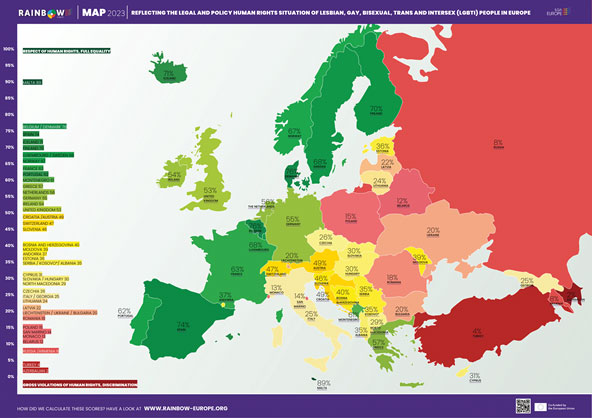Civil Society, Europe, Featured, Gender, Gender Identity, Headlines, Human Rights, LGBTQ, TerraViva United Nations

Credit: Ilmars Znotins/AFP via Getty Images
– Last month the Saeima, Latvia’s parliament, passed a package of eight laws recognising same-sex civil unions and associated rights. The new legislation came in response to a 2020 Constitutional Court ruling that established that same-sex couples have a constitutional right to the benefits and legal protections afforded to married opposite-sex couples.
Equal marriage rights are still a long way away, and civil unions are only a first step in the right direction. But in one of Europe’s most restrictive countries for LGBTQI+ rights, activists view it as a significant shift, achieved after numerous attempts over more than two decades. Anti-rights forces agree, and they’re not going to let it happen quietly. They’ve already responded with an attempt to stop the new law being adopted by campaigning for a referendum.

The breakthrough
The first registered partnership bill was submitted by the National Human Rights Office in 1999 but rejected by parliament’s Human Rights and Public Affairs Committee and never debated. Initiatives accelerated in the mid-2010s but were all rejected – the latest attempts coming in 2020 and 2022.
On 29 October 2020, a popular initiative calling for the passage of a civil union law that had gathered more than 10,000 signatures was voted down by parliament. Campaigners immediately started a new initiative for the ‘legal protection of all families’, which attracted over 23,000 signatures – but that too was rejected by parliament in December 2022.
Following the 2020 parliamentary vote, however, two court rulings catalysed change. In November 2020, the Constitutional Court found the labour law in violation of the constitution because it didn’t provide for parental leave to the non-biological parent in a same-sex relationship.
As the result of a 2006 anti-rights initiative to ban same-sex marriage, the Latvian Constitution defines marriage as a union between a man and a woman. The concept of family, however, isn’t explicitly defined in reference to marriage, and the court understood it more broadly as a stable relationship based on understanding and respect. It concluded that the constitution demanded protection for same-sex partners and gave parliament a deadline of 1 June 2022 to amend the law to provide a way for same-sex couples to register their relationship.
A year later, in December 2021, the Supreme Court ruled that if the deadline was missed, same-sex couples would be allowed to resort to the courts to have their relationship recognised.
Anti-rights backlash
The anti-rights reaction was quick in coming. Two months after the Constitutional Court ruling, parliament introduced a constitutional amendment that went further than ratifying the definition of marriage as being between a man and a woman, defining family as based on marriage.
To comply with the Constitutional Court’s ultimatum, in February 2022 the Ministry of Justice submitted a civil union bill and two months later, despite an attempted boycott to deny a quorum, parliament approved its first reading.
When it became apparent that the court’s deadline would be missed, same-sex couples started petitioning the courts for recognition as family units. The first of dozens of positive rulings was issued on 31 May 2022.
That same day a tight parliamentary vote resulted in the appointment of Latvia’s first out gay president. Momentum was building, and parliament finally passed a law to allow same-sex civil unions on 9 November 2023.
But conservative politicians managed to put the new law on hold as they seek to gather the signatures required to force a referendum that they hope will prevent its entry into force.
A long way to go
Even if it survives the challenge, the new law is no panacea. Ultimately, access to marriage is the only way to ensure LGBTQI+ couples have the same legal rights as heterosexual couples. Recognition of same-sex relationships is a step forward, but still leaves Latvia behind neighbouring Estonia, which legalised same-sex marriage in June.
If upheld, the new legislation will give registered same-sex couples some but not all the rights associated with marriage – they’ll have hospital visitation rights and tax and social security benefits, but not inheritance rights or the right to adopt children.
Beyond the legal sphere, the biggest challenge will come in influencing public attitudes, as signalled by Latvia’s scores on Equaldex’s Equality Index. This ranking combines a legal index that assesses key laws and a public opinion index that measures attitudes towards LGBTQI+ people. Latvia scores far lower for public opinion than for its laws. A 2019 Special Eurobarometer poll found that only 49 per cent of Latvians thought that LGBTQI+ people should have the same rights as heterosexuals.
The message is clear: changing laws and policies won’t be enough – and any legal victories will remain in peril unless social attitudes change.
Latvian LGBTQI+ organisations are fully aware of this, which is why they’ve worked on both fronts for many years. A centrepiece of their work to challenge prejudice is the annual Pride event, which Latvia pioneered for the Baltic region in 2005. As recounted by its organisers, Latvia’s Pride grew from 70 participants who faced 3,000 protesters in 2005 to 5,000 participants at EuroPride 2015, held in Latvia’s capital Riga, and 8,000 in the 2018 Baltic Pride, also held in Riga. Pride was repeatedly banned by Riga City Council, and it invariably faced hostile counter-protesters – but fewer each time, while the number of Pride participants has grown, boosting people’s self-confidence.
Global trends show progress towards the recognition of LGBTQI+ rights to be much stronger than regression. Latvian LGBTQI+ advocates will continue to push forward on both the policy and awareness-raising fronts. They’ll continue working to secure what they’ve already achieved while striving for more. They’re on the right course.
Inés M. Pousadela is CIVICUS Senior Research Specialist, co-director and writer for CIVICUS Lens and co-author of the State of Civil Society Report.
